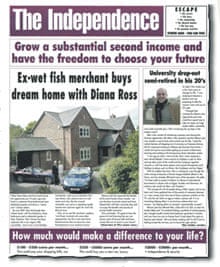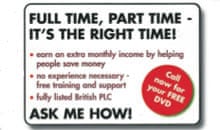
At first glance, the little cards landing on doormats up and down the country have all the hallmarks of a scam. "Would you like some extra money each month? More free time? To be able to choose your future?" they ask. It's "the opportunity of a lifetime", with no experience necessary. Full training and support are provided, free of charge. At the bottom, there's someone's name, a mobile phone number and a website address.
Most of us would probably stick the card in the bin, thinking it is a pyramid selling scam, or a get-rich-quick scheme that amounts to stuffing envelopes at home. But look again and you will see that "a major British plc" is involved.
Meanwhile, some people will have had a newspaper-style flyer through their letterbox filled with stories of ordinary folk who have bought "dream homes", Jaguars and Bentleys, and are enjoying all-expenses-paid cruises, after signing up for this "opportunity".
So what's it all about?
The answer involves lots of gobbledegook about "infinity payments" and "the power of duplication", and one of Britain's best-loved comedy duos.

However, this is no scam – it is all entirely legal and above board. The recipients of the cards and flyers are being invited to become a "distributor" (a sort of salesperson) for a company called the Utility Warehouse.
The firm's sales methods have certainly proved successful. So far it has signed up 320,000 homes and small businesses for its range of utility services – gas, electricity, broadband, and home and mobile phone. The Utility Warehouse brand is owned and run by Telecom Plus plc, which is listed on the London Stock Exchange, and it is licensed by energy regulator Ofgem and regulated by Ofcom. Dawn French and Jennifer Saunders have filmed a number of short, jokey videos promoting the brand. And last week it said it had been named the UK's best energy provider by Which? magazine.
But the company is controversial. A thread on MoneySavingExpert.com debating Utility Warehouse's pricing and service runs to 447 pages. During the past four years, it has twice had complaints about its leaflets upheld by the Advertising Standards Authority. The most recent run-in, in 2007, involved leaflets promoting its phone services, described as "misleading" by the ASA.
Customers persuaded to switch to Utility Warehouse can usually find better savings elsewhere. Its tariffs are broadly in line with the mainstream providers, but are around 20% more expensive than the best deals (see below).
The company is the first to say that "you may not have heard of the Utility Warehouse before". It does not advertise, does not have shops, and does not seek out national press coverage. In the short films, French and Saunders joke about "Utility Who-House?". It relies on "word of mouth recommendation by existing satisfied customers".
This is where its army of distributors come in. They earn money by encouraging people to become customers of the Utility Warehouse, and by "introducing" new distributors into the business. Last week, Telecom Plus said its distributor numbers had surged by nearly 5,000 in a matter of months to 31,800.
"The opportunity to save money and make money is a pretty compelling proposition at the moment," says Humphrey Couchman, Telecom Plus's communications director. He adds that this type of network marketing is much more established in the US; in the UK, there is "a certain cynicism about it," with some taking the view that it all "seems to be a bit too good to be true".
Asked how much its distributors could earn, he declines to give figures but says that for those prepared to work at it over time, "you can make a serious amount of money".
While the Utility Warehouse website carries a statutory warning urging people "not [to] be misled by claims that high earnings are easily achieved", it is less coy than Couchman about the sums its salespeople can make. One, an air stewardess from Lancashire, is quoted saying that "before I even think about my monthly commission I've received, I've had over £6,500 in bonuses alone in my first 18 months with the business! Not bad for part-time!"
To become a distributor, you sign up with an existing distributor, hence the cards and flyers carrying contact details. There is a £199.75 joining fee, which the company says is refunded if you recruit 12 customers in your first 90 days. Distributors earn a bonus of up to £40 for every customer they sign up, for example, £10 when someone takes out a mobile phone contract and up to £20 for broadband. They also earn a monthly income based on how much customers spend on the services they take. In addition, they can introduce other distributors to the business and earn a smaller amount of commission on what customers spend, too.
"Every time your customers make a phone call, switch on a light, turn on the heating or surf the net, you could be getting paid," the website says. "Imagine your team at Telecom Plus spreading out underneath you like a mushroom, going into hundreds or even thousands of distributors, dozens of levels deep, right across the country. As this happens, thousands of customers will be gathered for you by other people... The consequences of this is a massive group of customers and you getting paid on every single one of them – that's down to infinity," it adds.
Distributors can earn promotion when they hit targets, and pick up bonuses ranging from £250 to £20,000, according to the website. There are other incentives, including the chance to be given a Utility Warehouse-branded BMW Mini, and drive "one of the company's fleet of Porsche Boxsters".
So why is there no mention on the cards of the Utility Warehouse or how people earn the monthly income? "They are seeking to generate a certain level of intrigue," says Couchman. Once you start to talk about gas and electricity, "people tend to switch off".
Its methods may not be to everyone's taste but the company must be doing something right: last week, it said it was on target to report record revenue and a record dividend for the full year. If unemployment continues to rise, we are likely to see many more people enthusing about home phone and broadband deals in the hope of making a packet and, perhaps, getting the keys to one of those free Minis.
It pays to check the small print before making the switch
Utility Warehouse tries to grab customers with the lure of big discounts when they buy all its products, but a Money analysis of its complex tariffs suggests most people are better off elsewhere.
Customers of its dual-fuel gas and electricity tariff (which goes under the Telecom Plus brand) are typically paying around 20% more than if they were on the cheapest online tariff in their region.
TheEnergyShop.com comparison site shows Telecom Plus customers spending £1,100 to heat and light their home would save up to £230 a year by switching to the cheapest supplier. Those with above average consumption would save more.
The home phone/broadband offer from UW is not the cheapest. It is competitive, but only if you agree to take all four utilities, as that gives you free calls to other landlines. TalkTalk/Tiscali has a package which is cheaper, and comes with unlimited internet access. UW's basic broadband package has a 40GB limit and new customers don't get a wi-fi router.
In the mobile phone arena, it's a similar story. Someone wanting one of its pay-as-you-go Sim cards has to pay £10, which includes £3 of calls. After that you pay 12p/minute for calls and texts are 10p. However, switch to Asda Mobile (coverage is provided by Vodafone) and you'll pay £1 for the Sim, while calls are 8p/min and texts just 4p.
UW says anyone spending £350 a year on gas and taking all four offers is rewarded with £100 cashback at the end of the year. The website makes much of its energy "Triple Value" guarantee although, when you look at the small print, it only guarantees to be cheaper than British Gas's standard gas price, and that charged by your former regional electricity supplier. Every dual-fuel tariff will undercut those prices. The energy is supplied by npower whose own online tariff undercuts UW by £184.
The 5% cashback on member purchases at Sainsbury's and other selected retailers looks attractive. However you have to buy a pre-paid MasterCard for £9.99. It costs 35p to load up, or 2% if you use a credit card, eating into the 5% discount.
There is very little pricing info on the UW website. To get the true cost of everything you have to ring up. One positive note is that members have the benefit of only one bill for all utilities. Still, the system appears designed to reward members who can sell on its services –those who persuade 50 friends to buy all four services from the firm pay nothing for their own bills, which could easily be worth £2,000 a year.
Ratings winner
Consumer group Which? is standing by its rating system which puts Utility Warehouse top of the pack for home phones. Every year Which? asks members to say how utility providers have performed. In its most recent survey on energy, 119 UW customers out of 320,000 responded. Which? said it was confident UW salespeople are not skewing its findings.
"We go back to all our respondents to ask whether they are distributors for the company, and the data is amended to take into account any that are. We are confident our findings are robust," it said.
Ratings for UW also appear on moneysupermarket.com's website, which asks all power customers for feedback. Those who used Telecom Plus, its energy brand, give it 7/10. But it is evident that UW polarises opinion. Ratings tend to be 10/10, or 1 or 2/10. As with most websites, there is nothing to stop UW distributors (salespeople) posting reviews.